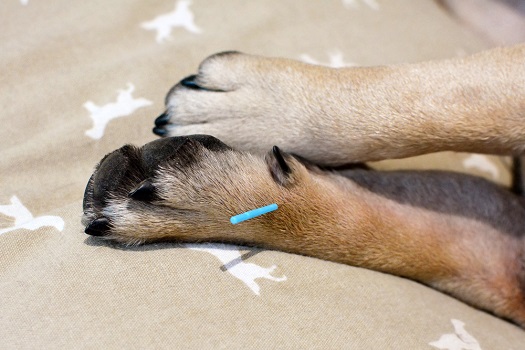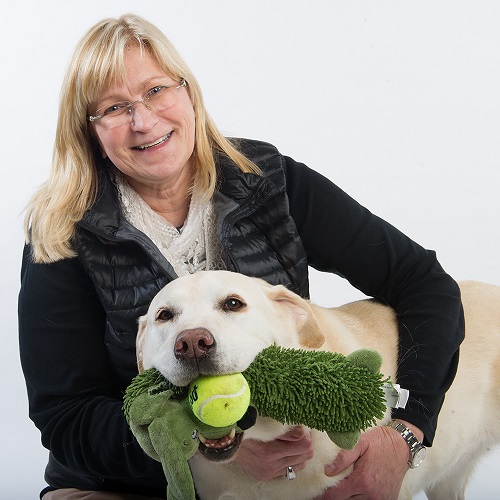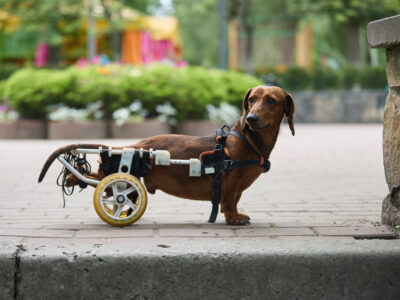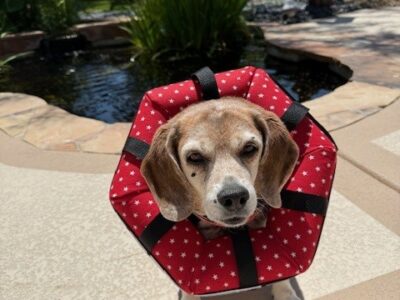
Table of Contents[Hide][Show]
If you like to think “outside the box” when it comes to solving a problem, you’ve come to the right place. Traditional Chinese medicine for dogs looks at health and disease in a vastly different way than conventional veterinary medicine.
Spine problems like Intervertebral Disc Disease (IVDD) and Degenerative Myelopathy (DM) are diagnosed by how they interrupt the flow of Qi (chi), or energy in the body. Veterinarians treat these conditions with the goal of restoring that flow.
Holistic Chinese care is a natural approach to healing pets that’s been around for 23 centuries. I find it fascinating.
Note: This story includes affiliate links. Read our policy here.
My first experience with traditional Chinese medicine happened several years ago when I added it to the treatment plan of my 10-year-old German shepherd. Bear developed Hemangiosarcoma which is a fast-growing cancer in the lining of the blood vessels.
Once a month he saw a Western veterinary oncologist for chemotherapy and every week our holistic vet monitored his disease with an herbal formula that slowed the bleeding in his blood vessels.
I wholeheartedly believe the combination of therapies gave Bear an extra four months with our family.
Later, when my dog Sophie became paralyzed with a progressive neurologic condition, I asked another holistic veterinarian for advice. It led to an in-depth conversation with Chris Bessent, DVM, a leading authority in traditional Chinese medicine for dogs.
Hundreds of dogs with spine and neurologic problems have passed through Dr. Bessent’s clinic during the 30 years of her career. She said they are among some of her most successful patients.
Dr. Bessent explained how Chinese medicine approaches IVDD and DM. She also discussed the benefits of herbs, supplements and alternative therapies.
Our interview is below.
Note: Please talk with your dog’s veterinarian before starting any of the treatments described in this article.
IVDD and DM explained

Intervertebral Disc Disease is a degenerative condition of the spine where the discs in a dog’s back age faster than normal. It’s estimated that 2 percent of dogs will be affected by the disease.
IVDD causes the vertebrae in the spinal column to bulge, rupture (herniate) or prematurely dry out. Mild IVDD leaves dogs with pain and mobility problems. Advanced cases cause paralysis.
Degenerative Myelopathy is a progressive neurologic disease that’s seen most often in older dogs. It targets the protective outer coating on the spine, called myelin, and makes it deteriorate. As the myelin strips away, the brain and spine stop communicating. Dogs first become paralyzed in their hind limbs, then the disease progresses to the front legs and ultimately to the organs.
Interview with Chris Bessent, DVM, MSOM, Diplomat of Oriental Medicine

How do you approach the medical care of IVDD dogs?
“Traditional Chinese medicine describes IVDD dogs as being hot, inflamed and obstructed,” said Dr. Bessent. “My goal is to help their bodies cool down.
The philosophy says that when a disc in the spine has ruptured or is bulging, it stops the movement of blood and Qi energy in that area. My job is to get it moving again.”
To accomplish this goal, dogs who come to Dr. Bessent with an IVDD incident, are given a combination of Chinese herbs and Western pain relievers and anti-inflammatory drugs. The conventional medications are prescribed for a short period of time while a dog is in crisis.
Steroids like prednisone can have a negative effect on a dog’s liver so I use them for the shortest time possible.
Dr. Bessent
The goal is to switch a dog to herbs and acupuncture for ongoing treatment. Dr. Bessent likes Frankincense and Myrrh for IVDD dogs. She recommends giving it twice a day.
Dr. Bessent uses a slightly different approach for IVDD dogs who had surgery to repair their spine. These patients are prescribed the herbs mentioned above along within Western pain relievers.
Explain how traditional Chinese medicine for dogs utilizes acupuncture
“I use a treatment plan of acupuncture for IVDD dogs who have feeling and deep pain sensations in their limbs after an IVDD incident.
Dogs have been brought to my office on a gurney because they were unable to walk, but if there’s feeling their limbs, acupuncture can get them back to whole.”
Acupuncture involves placing small measured needles under the skin, in target areas where the nerves and blood vessels come together. The philosophy says that health problems happen when the body is out of balance. It changes the Qi.
Acupuncture restores balance in the muscles, spinal cord and brain. It increases blood flow and lessens pain. It gives your dog a boost so they can heal faster.
Are there therapies that help prevent IVDD?

Dr. Bessent believes strongly that there are ways to prevent IVDD. They start with good nutrition and good spinal care.
“Every Doxie puppy should get a referral to a veterinary chiropractor and make it a lifelong habit of care,” said Dr. Bessent. “I recommend that my patients come in every 6 months for a treatment.
Discs don’t rupture overnight. Chiropractic care and good nutrition will minimize disc issues. With preventive care, dogs like Dachshunds, who are prone to IVDD, can have good spinal health.”
It’s Dr. Bessent’s belief that owners should have their dog examined when they notice any sign of pain. The earlier treatment is given, the better the outcome.

Get the Essential Guide
The Essential Guide of Products for Handicapped Dogs e-book is a labor of love for me. I wrote it to answer your most pressing questions about where to find the best products for your wheelchair dog. You’ll find products you didn’t know existed and each will improve your dog’s quality of life. Print a copy and keep it by your side.
What treatment do you prescribe for dogs with DM?
“In traditional Chinese medicine, dogs with DM are considered to have Wei (atrophy) syndrome,” said Dr. Bessent. “By definition, this is a group of disorders that cause the gradual decline of strength and loss of muscle mass in different parts of the body.
Wei syndrome is treated with herbs that tone and build the level of Qi (energy) in the body. Chinese medicine says that Qi builds strength. One of the best ways to build that strength is with acupuncture and electro-acupuncture.
I prefer electro-acupuncture because the needles send a warm wave of electricity to a dog’s spine. This stimulates the nerves in the hind legs.
Dogs should be seen by a holistic veterinarian as soon as they show the first signs of DM. That means go to the vet if your dog has hind end weakness, a change in how well they walk, knuckling paws, or trouble getting up off the floor. Patients who are still able to walk have the best results with acupuncture therapy.”
Chinese medicine believes dogs with DM need to tone their muscles and keep their blood moving. A great way to support this is with consistent, moderate exercise. Dr. Bessent recommends swimming or hydrotherapy and light walks.
She also prescribes omega-3 oil made from Krill. Omega-3 oil nourishes spinal cord tissues and when the source comes from little fish like Krill, it’s less likely to have toxins or heavy metals.
“I recommend that dog breeds, like German shepherds and Boxers who are prone to DM use herbs their entire life.”
Chris Bessent, DVM
Dr. Bessent offers a prescription strength herbal blend called Morinda Hindend Support for DM dogs. It contains: Morinda, a fruit known to sustain life; Astragalus, an herb used to boost the immune system; Cinnamon, a powerful antioxidant and more. The blend strengthens the hindlimbs and warms the spine.
Do you have tips for healthy dogs?
“All dogs should be on a daily regimen of a probiotic, prebiotic, omega-3 and glucosamine. Use a pre/probiotic that includes at least 10 billion colony forming units. Dogs need these good bacteria because commercial food can be sterile and upset a dog’s gut.”
Read more on this subject
The Healing Powers of Acupuncture
Intervertebral Disc Disease: Understanding the Condition
Degenerative Myelopathy: What Pet Owners Should Know






How do I find a local Vet who can help me with my IVDD dog of 3 years now? What are the costs behind going in this direction?
A good place to find a vet trained in Traditional Chinese Veterinary Medicine is at this site: American Holistic Veterinary Medical Association https://www.ahvma.org/ When you go to the site look for the tab that says Find A Vet.
Just type in your location. And regarding the cost, the vet my dogs have seen over the years is very reasonable. I’m sure the cost varies in each part of the country, but when you think about Chinese medicine, practitioners work with inexpensive herbs vs. expensive equipment.
Hello. Am based in the United Kingdom. Is it possible for me to purchase the herbal blend Morinda online ? Thanks
I recommend that you reach out to Herbsmith, (https://www.herbsmithinc.com/) about the Morinda herbal blend. This is Dr. Bessent’s company and where the source of the information from this story about Chinese Medicine.
I believe the product needs a prescription, but if you contact Herbsmith, I’m sure they’ll be able to answer your questions. Or you might want to contact a holistic vet in the UK. Regards, Sharon